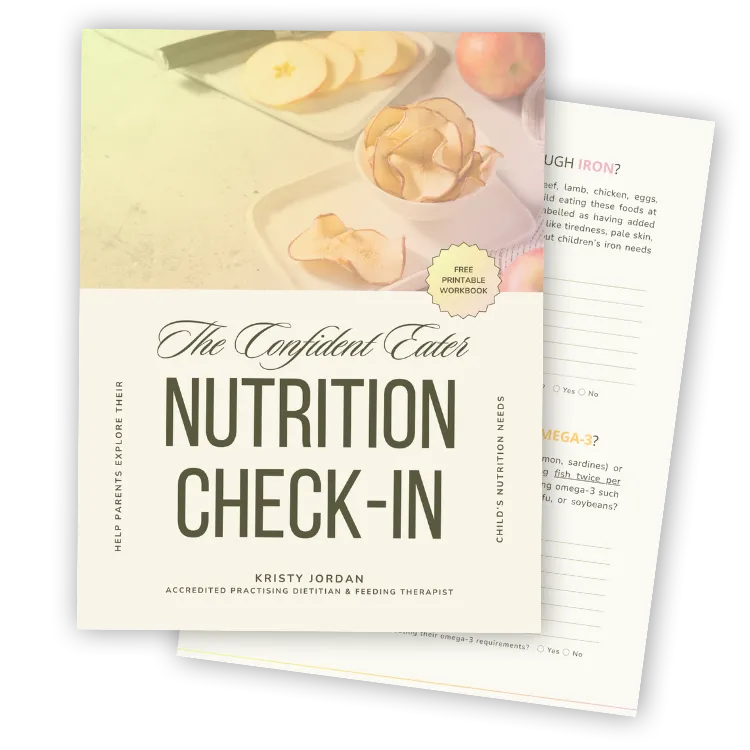
Helping parents of neurodivergent children reduce mealtime stress and expand food variety.
Helping neurodivergent children with autism, ADHD, and restrictive eating feel confident around food by supporting parents with practical, dietitian-led feeding guidance.
If mealtimes are filled with anxiety, sensory overwhelm, or nutrition worries, you are not alone. I help families to feel confident feeding their child.
If you are looking for simple steps that make a real difference, this is where to begin.
I went from feeling helpless watching meals go untouched to creating mealtimes where kids explore food willingly.
kristy jordan
dietitian & feeding therapist
Hi, I'm Kristy!
I know how exhausting and disheartening mealtimes can feel, especially when your child is autistic and food feels like a daily battle. I’ve seen the stress, the worry, and the frustration when every strategy seems to fall short.
Through years of working alongside families as a feeding therapist, I’ve learned how to create a mealtime environment that encourages eating. My approach helps children feel safe exploring food at their own pace, while giving parents the tools and confidence to support them without pressure.
I’ve walked with many families of autistic children as they’ve rebuilt trust at the table, celebrated progress, and rediscovered joy in mealtimes - and I’d love to help you do the same.

Support your child’s health and development by making achievable progress with food today

Are you worried about your child's nutrition?
A free, printable workbook for parents
How many times have you wanted to feel confident about your child’s nutrition, but felt stuck between worrying too much and avoiding thinking about it altogether?
If your child eats a limited range of foods, it is natural to wonder whether they are getting what they need.
This Nutrition Check-In is designed to help you understand where your child’s intake may already be okay, and where extra support might be helpful.
Ready to build the family meals of your dreams?

Join The Community
Get guidance from experts and join a supportive community of parents who understand. Together, we’ll help you create a mealtime environment where your child's needs are being met, and you can relax knowing you are doing everything you can to support them in their journey.

Follow Me On Instagram
Get daily tips, inspiration, and behind-the-scenes insights to help you stay motivated and improve your relationship with your child at mealtimes.

Subscribe To The Newsletter
Subscribe to the Grate Adventure newsletter for actionable strategies, expert advice, and inspiring stories to help you to learn what changes you can make to help your child, starting today.
Are you ready for more?
Ready to build the life of your dreams?

Let's chat
Ready to work with a coach to uplevel your life and business?
Listen to the
Podcast
view my
services
read the
BLOG
Let's chat
Ready to work with a coach to uplevel your life and business?


Let's learn
Learn at your own pace and make quantum leaps.
Student Love Notes
We've helped so many incredible students to find success as Virtual Assistants...

The VA Business Blueprint helped me to go from feeling completely stuck to starting my business and getting my first client!
Ellen, business name

I enrolled in the VA Services Academy feeling completely lost - within 2 weeks I knew exactly what to offer & what to charge.
Ellen, business name

Beginner to Booked Out was a game-changer for me. Anna and her team are incredible and I'm booked out for the next 3 months!
Ellen, business name
New on the blog...

Dinner Without Drama: A 5-Day Reset for Calmer, Happier Mealtimes

What Happens When Your Child Doesn’t Eat? How Food Affects Your Mood

Constipation in Neurodivergent Children: A Practical Guide for Parents
New on the blog...

What Happens When You Don’t Eat? How Food Affects Your Mood
I am well aware that for some eating anything is better than nothing. And sometimes eating just doesn’t happen for reasons outside your control. But for the times where this is relevant…
When you go too long without eating, your blood sugar levels fall - and the brain, which runs almost entirely on glucose, starts to struggle.
Low blood sugar can cause:
Irritability or meltdowns
Difficulty concentrating
Low energy or fatigue
Anxiety or tearfulness
This is not “bad behaviour.” The brain simply needs fuel to function well. Studies show that going long periods without food can cause tiredness, irritability, and poor focus due to low blood glucose.
Skipping meals also means the body misses opportunities to get vital nutrients - iron, zinc, omega-3s, and B-vitamins - that support healthy brain chemistry and mood.
Why those specific nutrients matter for mood and brain function:
Iron: required for oxygen transport and dopamine synthesis. Low iron is associated with fatigue, poor concentration, and mood changes.
Zinc: involved in neurotransmitter regulation and neuroplasticity. Low levels have been linked with anxiety and depressive symptoms.
Omega-3 fatty acids: vital for brain cell membrane integrity and anti-inflammatory effects. Low omega-3 status correlates with poorer mood and cognitive function.
B-vitamins (particularly B6, B12, folate): co-factors in serotonin and dopamine synthesis; deficiencies can impair mood regulation and energy metabolism.
Foods That Help Maintain Energy and Mood
Balanced, consistent meals keep blood sugar steady and help the brain stay regulated.
Focus on:
Slow-Release Carbohydrates (for steady energy and mood)
Try to offer a mix of familiar and soft-textured options that keep blood sugar stable:
Oats or porridge (can blend smooth or bake into muffins)
Weet-Bix, Cheerios, or other lower-sugar cereals
Wholegrain or high-fibre white bread, wraps, or English muffins
Rice cakes, corn thins, wholegrain crackers
Pasta, noodles, or rice (white, brown, or mixed with quinoa)
Potato, sweet potato, or oven fries
Popcorn (air-popped or lightly salted)
Pancakes or waffles made with added oats or wholemeal flour
Homemade muffins or bliss balls (blend oats + nut butter + fruit)
Protein Foods (for focus and emotional regulation)
Protein supports neurotransmitter production and steadier energy. Offer small, manageable portions and varied textures:
Eggs (boiled, scrambled, omelette, or egg muffins)
Chicken or turkey (crumbed, skewered, or shredded into sandwiches)
Mince dishes (spaghetti bolognese, tacos, meatballs, sausage rolls)
Beef or lamb (slow-cooked, burgers, or strips)
Fish (salmon, tuna, fish fingers, crumbed fillets)
Dairy foods (yoghurt, cheese slices, string cheese, custard, milk)
Legumes (baked beans, lentil bolognese, hummus, chickpea patties)
Smoothies with milk or yoghurt + nut butter or oats
Nuts, seeds, or nut/seed spreads (if safe for the child)
Edamame or tofu (crispy tofu cubes or added to noodles)
Healthy fats: salmon, avocado, chia seeds, walnuts – support brain function and calmness.
Fruits and vegetables: provide fibre, vitamins and minerals for gut and brain health.
Hydration: even mild dehydration can affect concentration and mood. Encourage water between meals.
Foods and Habits That May Negatively Affect Mood
Some foods make blood sugar - and mood - rise and fall sharply. These include:
Sugary cereals and drinks: cause rapid spikes and crashes in glucose, leading to irritability or fatigue.
Highly processed foods: low in fibre and nutrients, can disrupt gut health and mood regulation.
Long gaps between meals: leave the brain under-fuelled and stress hormones high.
Caffeine or energy drinks: can cause jitteriness, anxiety, or sleep problems in children and teens.
In simple terms: the brain likes slow, steady fuel. Foods that rush in and burn out quickly make it harder to stay calm, focused, and emotionally even.
When ADHD Medication Suppresses Appetite
Stimulant medications (used for ADHD) can lower appetite, making it hard for kids to eat enough during the day. When this happens, blood sugar dips - and mood often dips with it.
Practical ideas:
Offer a high-protein, high-energy breakfast before medication takes effect (e.g., eggs, yoghurt, or smoothies).
Plan nutrient-dense snacks for later in the day, when appetite returns.
Avoid pressure; instead, offer small, appealing portions often.
Discuss timing with the prescribing clinician if appetite loss is severe.
Practical Ways to Keep Eating Regular
Feeding neurodivergent children is rarely simple. Here are some gentle, realistic strategies that can help:
Keep regular rhythms: meals or snacks roughly every 3–4 hours.
Use visual or audio cues: timers, meal schedules, or checklists can support predictability.
Pre-prepare foods: boil eggs, wash fruit, portion out crackers or trail mix.
Pair food with comfort: soft lighting, favourite plate, calm music - sensory comfort encourages eating.
Plan for yourself too: your own meals matter; children model what they see.
Food, Mood, and the Gut–Brain Connection
Emerging research shows the gut and brain communicate constantly. Fibre, probiotics, and plant-based foods feed healthy gut bacteria that, in turn, produce compounds influencing mood and stress response.
A simple way to nurture your gut-brain connection is to include a few plant foods at every meal (fruit, veg, grains, nuts, seeds).
References
Nutrition Australia. How food can affect your mood. nutritionaustralia.org
University of Michigan School of Public Health. Is Your Mood Disorder a Symptom of Unstable Blood Sugar? sph.umich.edu
Food & Mood Centre, Deakin University. Diet and mental health in children and adolescents. foodandmoodcentre.com.au
Young Minds Network. The role of nutrition in your child’s mental health. youngmindsnetwork.com.au
Only About Children. The Link Between Mood & Food. oac.edu.au
Firth et al. (2020) Psychiatry Research and Jacka et al. (2017) Nutrients (Deakin University’s Food & Mood Centre).
Need Support?
If you have questions about your child’s eating, energy, or mood please reach out. Feeding challenges are complex, and every family’s situation is unique. Sometimes it takes a bit of guidance to work out what is realistic and what might help.
You can get in touch with me here or explore more resources inside the Grate Adventures Feeding Therapy Community.

